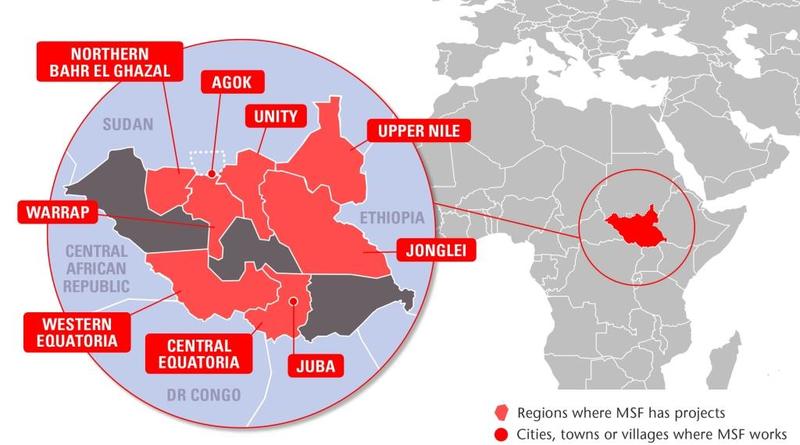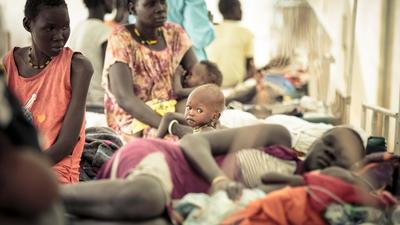South Sudan became the world’s newest country after gaining independence from Sudan in July 2011.

The 2005 peace deal that led to South Sudan’s new beginning ended Africa’s longest running civil war.
But, in December 2013, the landlocked country in eastern central Africa – home to more than 12 million people – was plunged back into chaos. A civil war erupted amid a power struggle between the president and his deputy.
Médecins Sans Frontières/Doctors Without Borders has been working in the area that now constitutes South Sudan for more than 30 years, responding to conflicts, neglected diseases and filling healthcare gaps wherever needed.
[[Country-Facts]]
MSF’s work in South Sudan: 2015
MSF responded to immense medical needs amid a major upsurge in conflict and violence against civilians, as well as an exceptionally severe malaria season.
More than two years of sustained conflict and violence against civilians have taken a huge toll on the people of South Sudan.
Over one million people have been displaced and hundreds of thousands have been unable to access medical or humanitarian assistance for months at a time, particularly in Jonglei, Unity and Upper Nile states.
We scaled up our programmes in response, but access was disrupted repeatedly by fighting and attacks on medical facilities.
We treated a total of 295,000 patients for malaria during the year – nearly ten times as many as in 2014.
Extreme levels of conflict, violence and humanitarian need
There was an escalation in conflict and violence in Unity state between April and November, forcing hundreds of thousands of people to flee their homes. Many hid in the bush and swamps and MSF received reports of executions, mass rapes, abductions and the razing of entire villages.
Five South Sudanese MSF staff were killed amid the extreme levels of violence, and 13 remain unaccounted for.
MSF was forced to temporarily evacuate from Nyal, in May, and twice from Leer, in May and October. The population of the UN protection of civilians site (PoC) in Bentiu in northern Unity state increased from 45,000 to over 100,000 by the end of 2015, as people sought shelter.
MSF runs the only hospital in Bentiu PoC and the team rapidly expanded capacity to meet the enormous medical needs of this vulnerable population.
Thousands also fled into northern Jonglei state, where MSF opened a project in Old Fangak providing assistance in a medical centre, mobile clinics for the region and referrals by boat ambulance. MSF opened another clinic in Mayom, a remote location in northern Unity state, providing basic healthcare and secondary referrals to its hospital in Agok.
Teams also responded to outbreaks of diseases including measles, malaria and meningitis in Yida refugee camp, currently home to 70,000 Sudanese refugees.
Assisting people caught on the frontline
In Upper Nile state, the surge in conflict impacted people accessing care in MSF’s projects along the White Nile river; in Malakal, Wau Shilluk and Melut.
[[Article-CTA]]
People in Wau Shilluk had extremely limited access to assistance for months, and thousands of civilians crossed the river in search for protection and assistance.
The population of the PoC site in Malakal swelled from 21,000 to 48,000 and many were forced to live in overcrowded, unsanitary and inhumane conditions. MSF runs the only hospital in the Malakal PoC and teams responded to major outbreaks of disease including malaria, respiratory tract infections and diarrhoea.
In Wau Shilluk, MSF expanded the capacity of its primary healthcare centre to include secondary care, in order to meet the increased needs of the population. Elsewhere in Upper Nile state, MSF continued to provide medical assistance in Doro refugee camp for 50,000 Sudanese refugees from the conflict-affected Blue Nile state as well as the host population in Maban county.
Responding to emergencies and outbreaks of disease
For the second year running, there was an exceptionally severe malaria season across South Sudan, particularly in the northwest.
The impact of the outbreak was exacerbated by severe shortages and stock outs of essential medicines in non-MSF health facilities throughout the country.
MSF teams saw dramatic spikes in the disease in its projects in Agok, Aweil, Bentiu, Doro, Gogrial, Mayom and Yida and responded by rapidly increasing treatment and bed capacity, conducting large malaria outreach programmes and scaling up support to other medical facilities in the surrounding areas.
South Sudan was also hit by a second outbreak of cholera in two years. In response, MSF provided treatment, technical capacity and logistical support to the cholera treatment unit in Bor hospital in Jonglei state. Another team in the capital, Juba, opened a cholera treatment centre and vaccinated over 160,000 people against the disease.
In September, following the explosion of a fuel truck that killed more than 200 people and injured over 100 in Maridi, MSF provided surgical care, medical supplies and long-term nursing support for injured patients. MSF also continued to run its HIV ‘test and treat’ programme in Yambio, despite outbreaks of violence.
Find out more in our 2015 International Activity Report









